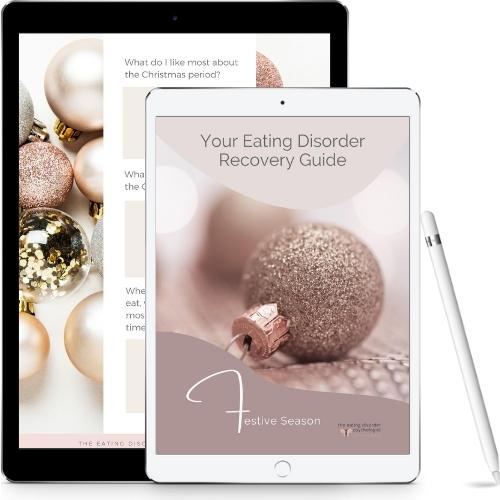The Festive Season is here again! Like every year, it can be a time of joy, happiness, love, shared experiences and lots of laughter. But for those with eating disorders, the festive season can involve increased anxiety, panic, fear and overwhelming feelings of inadequacy and insecurity.

For those who do not experience eating-related concerns, it can be difficult to comprehend these levels of anxiety and fear, and for some, can contribute to further distress at this time of year.
Whatever your unique situation is, it is important to think ahead and develop plans and coping strategies to feel more in control and empower your recovery. To help you through this challenging period, here are some tips to build your resilience and reduce the possibilities of relapse:
Identify your Main Worries
Consider the events or situational possibilities that most scare you. The ability to identify and anticipate potential triggers is an empowering tool to facilitate feeling in control. Worrying about them serves only to fuel your anxiety but also underestimates your abilities to cope.
Once you have listed your main worries, begin identifying alternative coping options. These do not need to be detailed or prescriptive, however, developing strategies to manage certain situations often tends to reduce anxiety and stress levels.
Remind yourself of your Recovery Goals
Recovery from an eating disorder can mean different things to different people. Now is the time to reflect on your recovery goals and think of some of the steps you can take to work toward them during this time. View this period as a series of skill-based challenges you will be learning about, and mastering over time.
Lapses are a natural and normal part of this process, so it is important to practice reflecting on these with compassion. Think about what you would need to do and say to be kinder to yourself during this time.
Make a Plan
Gain clarity on the practical expectations of the festive period for you. This involves asking the right questions so that you are both aware of and in control of plans set out for the holiday period. It is helpful to map out what you are doing, when and with whom. It is also helpful to be mindful of agreed obligations and reflections about your needs in these situations.
You can be guided by previous holiday/festive periods as to what to expect as well as what you would like to happen differently this year.
With regards to anxiety about food, try to discover what will be served ahead of time. If there are any meals that cause heightened anxiety for you, try talking to a family member/loved one about how best to navigate the situation.
Stick to a Regular Eating Routine
Rather than try to eat large meals as if often the norm during the holidays, practice sticking to your regular eating routine, but allow some flexibility.
If an eating plan has been designed for you either by a dietitian, therapist, or another expert, discuss how best to maintain your meal routine during this time.
Getting through a big day can feel overwhelming. Try breaking it down into more manageable parts to help maintain focus on the present and to different activities throughout the day.
Identify your Support System
Having a support system means that you’re not feeling completely alone and reminds you that you have people around you who are willing to help and guide you through these challenges. Your support system can involve a friend or family member who is perceptive enough to know when you need to be called away for chat or a walk. You can set these up beforehand so the other person is aware when you might need some help.
If you worry about being ‘observed’ when eating or that someone will make comments about your eating, physical appearance, etc., this can feel extremely destabilising. It becomes easy in these situations to lose focus and obsess about what has been seen or said. Where possible, think about helpful responses such as “I can’t talk about that right now”; “ Could we please change the subject, I’m struggling a little”. Alternatively, try changing the subject by asking another person a question, or walking away from the situation.
You can also contact helplines, so have some of these resources on hand.

Plan your Exit
Having everything in abundance (friends, family, food and drink) all at once, can be overwhelming. It really is okay to want to take a break from it all. Anticipate which events might be more overwhelming than others and plan your exit strategy, if it all becomes too much to bear.
In familiar places, you can map out some quiet areas where you can ‘regroup’. You can use this time away to text or call a friend (who might be on standby). You can excuse yourself by saying you need to make a quick call, or perhaps you are not feeling too well, so need to go outside for a walk. You can also let people know beforehand, that you are unable to stay for very long and have to leave by certain time. Having an exit strategy facilitates you feeling more in control and less ‘trapped’ in a situation.
Be Willing to Experience New Things
There is a difference between being aware of your health limitations and allowing them to control your existence. Although you may sometimes feel weary of being in a social gathering lest you worry about being judged, it is equally important not be isolated from those who genuinely care about you.
Try not to allow your eating disorder to prevent you from enjoying time out with your family and friends or participating in fun activities if that is what you wish. Although there may be some anxiety-provoking experiences at festive dinners and parties, it is likely that these are also filled with people who want to spend time with you and offer you their support.
Breathe
You are likely to feel overwhelmed and anxious at some point during the holiday period. When this happens, try to focus on taking deep, slow, rhythmic, controlled breaths, as you ground your thoughts and mind to help maintain a sense of calm and control.
There are many breathing exercises you can try out. Here is one to practice which can help you manage anxiety:
- Locate a quiet, comfortable place. Sit in a relaxing position, close your eyes and listen to your breathing
- Focus on your breath and you breathe in slowly to a count of 3, hold your breath for a few seconds. Then exhale to an even slower count of 4.
- Practice this for a few minutes each day. As your mind drifts to anxious thoughts, practice re-focussing on counting your breaths and imagine you’re your diaphragm filled with oxygen. Visualise oxygen going all the way up and out through your nose.
This is an exercise you can do in front of others, without them noticing (without your eyes being closed!).
When feeling especially overwhelmed and at risk of completely disconnecting, here is an example exercise to ground you in the present:
- Name 5 things you can see around you
- Name 4 things you can touch
- Name 3 things you can feel
- Name 2 things you can hear
- Name 1 thing you can smell
Finally, remind yourself that you are stronger than you think. Focus on how much you have missed your friends and family and how good it is to be spending moments of time with them. Try to enjoy the beautiful seasonal songs, help put up the Christmas trees (if this is your thing), play and run in the snow (weather dependent!) and remember to reach out to others.
If you find prepping and planning for the festive season overwhelming, try using our ‘Pocket Guide’ below:
https://download.theeatingdisorderpsychologist.com/christmas-recovery-guide

If you or a loved one is struggling with an eating disorder, please contact us here:
https://theeatingdisorderpsychologist.com/contact-us/
We are happy to answer any questions you have about our services. You can book a FREE consultation call here:
https://theeatingdisorderpsychologist.com/lets-talk/
You can read more about our services here:

